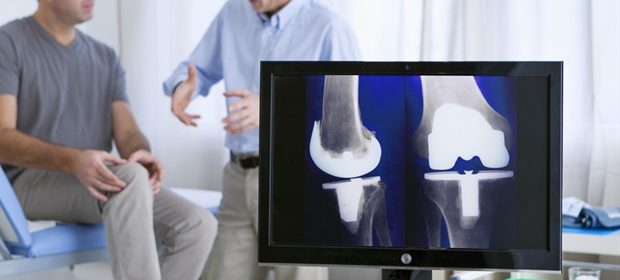Study: Duloxetine may reduce cumulative opioid use after total knee arthroplasty

In a study conducted by researchers at Hospital for Special Surgery (HSS), cumulative opioid use was reduced by 30% in a patient group that received duloxetine after total knee arthroplasty (TKA) compared with patients who received placebo. Patients who received duloxetine also reported higher pain management satisfaction and less pain interference with mood, walking, normal sleep, and work activities. These findings were presented at the 2021 Spring American Society of Regional Anesthesia and Pain Medicine (ASRA) Annual Meeting.
Studies have demonstrated that many patients report joint pain two weeks after TKA. Given the status of the ongoing opioid epidemic, it is critical to study safe and effective alternative pain treatments.
Previous research has shown us how to keep most patients relatively comfortable for the first one to two days after TKA. However, patients often have significant and troubling pain during the first two weeks, once the nerve blocks wear off. They often take large amounts of opioids. It is important to reduce postoperative opioid use without increasing pain or worsening the patient experience."
Jacques Ya Deau, MD, PhD, principal investigator, anesthesiologist at HSS
Finding alternative strategies for pain relief after TKA is imperative, as improved postoperative pain management is linked to improved patient satisfaction, faster rehabilitation, and reduced complications.
Dr. Ya Deau and colleagues enrolled 160 patients undergoing TKA into the study and randomized them into a duloxetine or placebo group. Patients took 60 mg of oral duloxetine or placebo once daily for 14 days after surgery and answered questions on postoperative days one, two, seven, 14, six weeks, and 90 days. Postoperative pain management also included acetaminophen, ketorolac, meloxicam, and oxycodone as needed.
The researchers collected data on numerical rating scale (NRS) scores for pain management, opioid consumption, patient satisfaction, and questions based on the Brief Pain Inventory.
Duloxetine was found to be better than placebo for reducing opioid use and was of equal efficacy to placebo for reducing pain. Duloxetine was also better than placebo for patient satisfaction and for the effect of pain on mood, walking, working, and sleeping.
"Duloxetine, given on the day of surgery and once daily for 14 days afterwards, reduces opioid use by about 30%. Patients receiving duloxetine are more satisfied with their pain management, and pain interferes less with their activities and mood," Dr. Ya Deau said.
Hospital for Special Surgery
Posted in: Medical Procedure News | Medical Research News | Pharmaceutical News
Tags: Acetaminophen, Acute Pain, Anesthesiology, Arthroplasty, Children, Drugs, Duloxetine, Education, Efficacy, Hospital, Joint Pain, Knee, Knee Arthroplasty, Knee Replacement, Medicine, Musculoskeletal, Nerve, Nursing, Opioids, Orthopedic, Orthopedics, Oxycodone, Pain, Pain Management, Placebo, Research, Rheumatology, Sleep, Surgery, Therapeutics, Walking
Source: Read Full Article